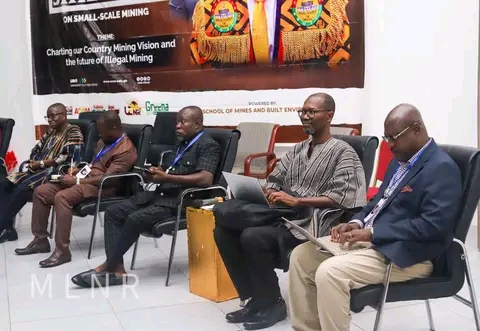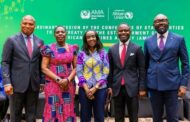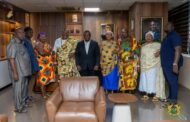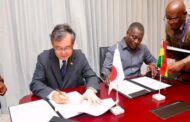On Thursday, 16th May 2024, the 3RD day of the 3rd Annual Transformational Dialogue on Small- Scale Mining of the University of Energy and Natural Resources (UENR), witnessed a thought-provoking panel discussion featuring the Advisor on Mining to the Minister for Lands and Natural Resources, Mr. Benjamin Aryee, and other industry experts discuss financial solutions in the small-scale mining industry.
The insightful event hosted panels to discuss the theme “Charting our Country Mining Vision and the future of illegal Mining”.
The Panel generally agreed that, appropriate access to funding is crucial for responsible and sustainable small scale mining operations within the legal framework while noting key challenges which inhibit this to include lack of or inadequate collateral, geoscientific information on their concessions and/or record keeping of their performance.
Mr. Henry Osei, Director of Research at the Chamber of Bullion Traders, indicated the importance of small scale miners thoroughly researching and evaluating financing options, saying, “It is crucial for small scale mining companies to determine the best fit for their specific needs and circumstances.”
He outlined some key importance of easing access to financing for mining, as enabling investment in equipment and infrastructure, facilitating exploration and development of mineral resources, and supporting community development initiatives.
While agreeing with the strong emphasis of other panelists that responsible and sustainable mining (including small scale mining) can only occur if it is viable and therefore based on exploration results, Mr Benjamin Aryee, representing the Ghana Extractive Industry Transparency Initiative ( GHEITI) disagreed with the allegations by other panelists.
The Advisor on Mining emphasised that Ghana, with the assistance of the UNDP, developed a Country Mining Vision (CMV) as far back as 2015, which sort to domesticate the Africa Mining Vision and align it the country’s mining policy.
He added that the CMV-aligned policy is currently under revision and stakeholder engagements are presently ongoing.
Mr. Aryee also explained that, given the cost of exploration, Ghana’s size of area with the potential for mineralization would need to undergo exploration before being granted to small scale miners so the only option left is for government to champion it “pilot and then scale up”.
This, he assured the forum, that government is actively doing through the Minerals Commission, in collaboration with exploration companies or through funding the Ghana Geological Survey Authority. Again, with respect to the size of a concession area.
Mr. Benjamin Aryee also explained that government had provided small scale miners with both short and long term financial support. The short term support was mainly in terms of working capital and input supply to become a revolving fund to be enjoyed by others as beneficiaries paid back.
The long term support along with the full value chain, from exploration through mining to marketing, either directly or in partnership with or through large scale miners, development partners like the World Bank, etc.
In his concluded submission, he emphasized that provision of finance would not be a panacea to resolving the illegal mining problems.
He further called for collaboration among all stakeholders to agree to objectives and standards, while ensuring that the objectives set would be achieved within a framework of compliance and enforcement.
Source:Mybrytfmonline.com/Kwabena Nyarko Abronoma




















































